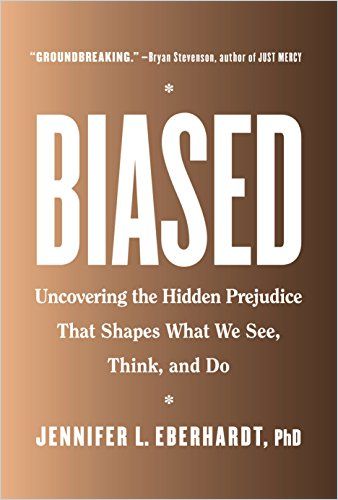Stanford psychology professor and MacArthur Fellow Jennifer Eberhardt offers a detailed, illuminating – and at times disheartening – overview of bias in America and how it manifests.

American Bias
Stanford psychology professor Jennifer L. Eberhardt, a MacArthur Fellow, shows how stereotypes arise and how they shape people’s perceptions and actions. Applying research studies and history lessons, Eberhardt demonstrates that bias against African-Americans is pervasive and longstanding in the United States. Luckily for those seeking a more just world, she also illustrates how people can journey through the challenge of bigotry and come to appreciate diversity. She names knowledge as the first step. Students, social scientists, businesspeople and those seeking greater mutual understanding will benefit from Eberhardt’s considerable insights.
Research supports the notion that raising the issue of race and discrimination explicitly can lead people to be more open-minded and act more fairly.Jennifer L. Eberhardt
The awards Eberhardt has garnered for her groundbreaking work include the William James Book Award from the American Psychological Association and
The Society for Personality and Social Psychology Book Prize. Bias was
Nonfiction Runner-Up for the Dayton Literary Peace Prize.
Esquire.com found this to be, “an exhaustive investigation of how bias infiltrates every sector of public and private life…Eberhardt offers tips for reforming business practices, police departments and day-to-day interactions in pursuit of a fairer world for everyone.” Psychology Today admires it as, “An immensely informative and insightful analysis of race-based stereotypes….[that] also offers practical suggestions for managing mechanisms of prejudice that ‘are rooted in the structures of our brains’.”
Racial Categories
Writing in crisp language, Eberhardt says the human brain evolved with a “same-race advantage,” a built-in bias that, she asserts, often leads to the misidentification of criminals if they’re from a different race than their victims.
Bias determines who gets to shine, who’s allowed to stand out, who is lauded for being a ‘disrupter,’ and who is sidelined for being disruptive.Jennifer L. Eberhardt
White Americans, the author reports, often associate African-Americans with aggression, and so they misinterpret Black people’s facial expressions. Parents transmit biases to their children. When kids see someone being treated badly or without respect, they assume that person must be bad and must deserve poor treatment.
Police Interactions
Eberhardt details how, shockingly, police officers killed almost 1,000 people in the US in 2016. The author developed training methods for law enforcement personnel to help them combat implicit bias. She showed officers and non-officers words related to criminal activity, and discovered this caused them to focus attention on a Black face instead of a white one. Study participants saw Black people’s bodies as bigger and more threatening than they were.
California mandates the collection of demographic data for every police interaction. Eberhardt explains that residents of Oakland, California advocated for this record-keeping in the late 1990s when “vigilante cops” framed innocent people, assaulting and arresting them.
Eberhardt invites readers into the saga of how her team analyzed 28,000 police stops in Oakland between 2013 and 2014 and found that police disproportionately stopped Black residents, and were more likely to arrest them than white residents they stopped. Oakland police, the author notes, hear “male Black” hundreds of times daily over their radios. They pair race and crime, and that subliminally affects their perceptions. Eberhardt’s on-the-ground research and profound immersion in these law enforcement issues grants her particular credibility when describing police officers’ emotions.
Research and real-life experience have shown that if officers act in accordance with four tenets – voice, fairness, respect, trustworthiness – residents will be more inclined to think of the police as legitimate authorities.Jennifer L. Eberhardt
Police stop Black people twice as often as whites. Some departments use stops as a revenue source. When minor traffic stops escalate, Eberhardt reveals, police charge drivers with other offenses. Arrested drivers must post bail, but the poor often can’t afford it. With great compassion and quiet outrage, Eberhardt chronicles how, when the system detains and imprisons people, their bills mount, their employers grow impatient, their landlords threaten to evict them, and they lose custody of their children.
This makes suspects desperate for freedom, so they enter guilty pleas, even when they’re innocent. Then they must live with the long-term consequences of a criminal conviction.
Discrimination
Eberhardt describes the stringencies of racism in American life before the Civil Rights movement: government-backed segregation determined where Blacks went to school, what parks their children could play in, and what restaurants, hotels and hospitals would accept them. Despite integration, economic disparities separate Black and white people today.
Integrated schools promise to turn us into global citizens, appreciative of cultural differences, skilled at navigating diversity.Jennifer L. Eberhardt
Eberhardt sadly offers the shocking truth that segregation in the United States has “more than tripled” since the 1980s, due to court rulings constraining busing and overturning desegregation programs.
Bias extends beyond prejudice against African-Americans, the author notes. For example, from 2015 to 2017, anti-Semitic acts including threats and vandalism spiked 60%.
Starbucks
After a Starbucks manager had two Black customers arrested because they used his shop’s bathroom without buying coffee, Starbucks closed all its stores to conduct employee training on discrimination. This effort may not change employee biases, but it proclaimed that Starbucks will not tolerate discrimination. Eberhardt applauds Starbucks’ conviction and believes public displays by large corporations breed greater tolerance, or at least reduced tolerance for intolerance.
Impassioned Scholarship
Jennifer Eberhardt won a rare honor: a MacArthur fellowship. You cannot apply for this considerable cash award. You cannot lobby for it. The MacArthur Foundation gives its rewards on the basis of the recipients’ creativity and contribution to society. The judges chose Eberhardt for her evocative, readable writing, which is rare among academics, and for the impact of her work. The number of years she put in on the front lines of research in her field are even more unusual. Eberhardt earned the qualifications and standing to write credibly about the processes of bias in the United States. She never devolves into political rant, though she also doesn’t try to hide her sadness, frustration and outrage. Amazingly, Eberhardt believes that progress against bias is possible. Delving into her extraordinary report is an excellent first step in making that progress.












